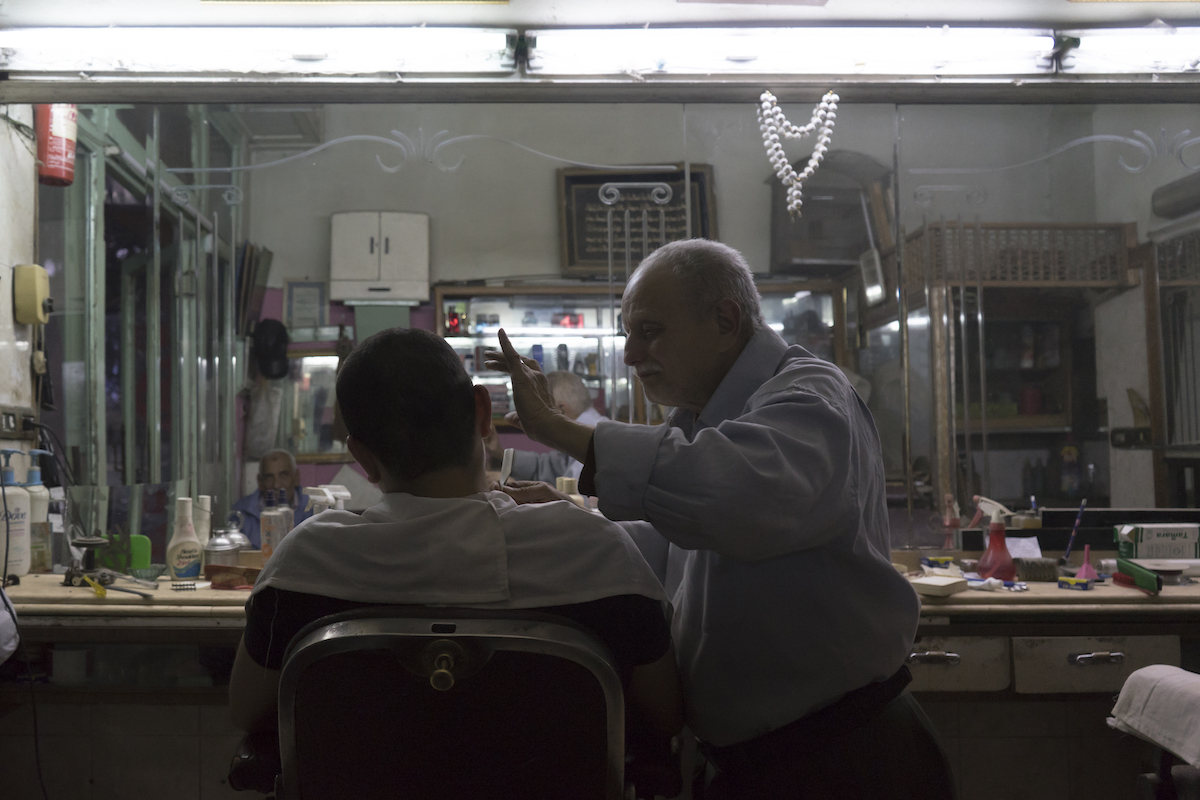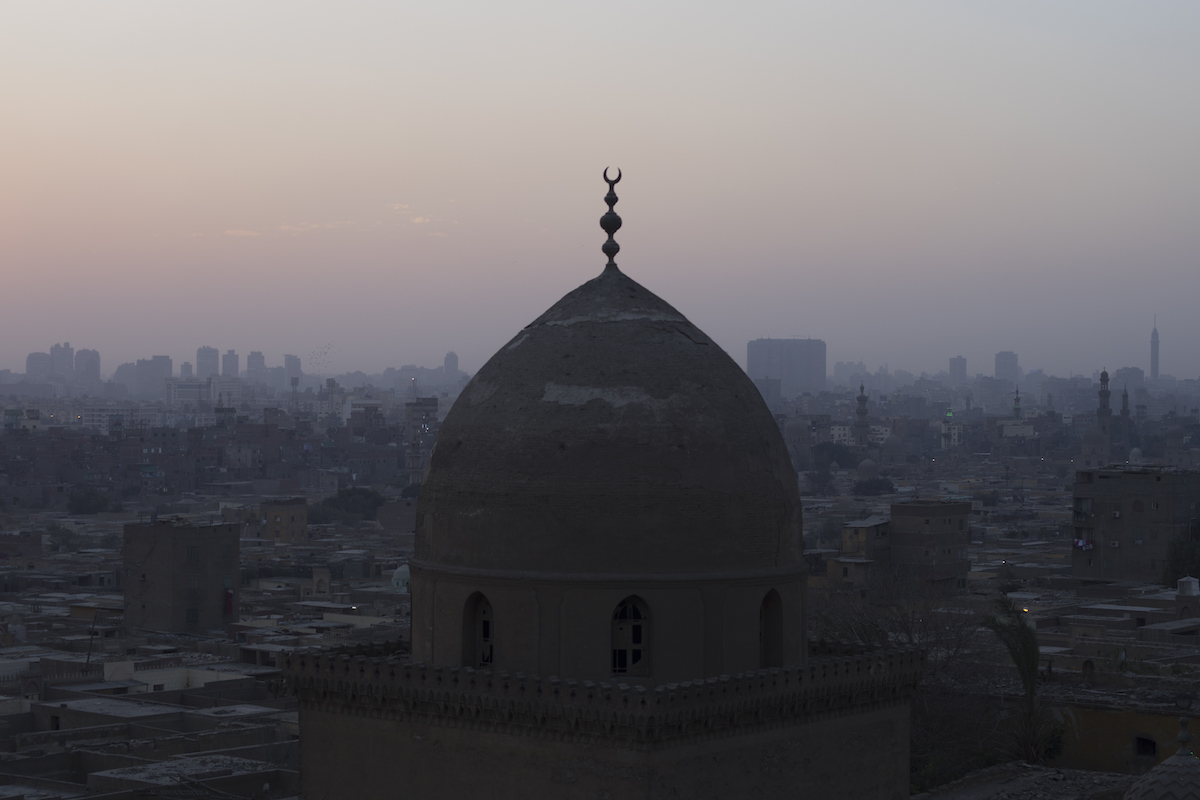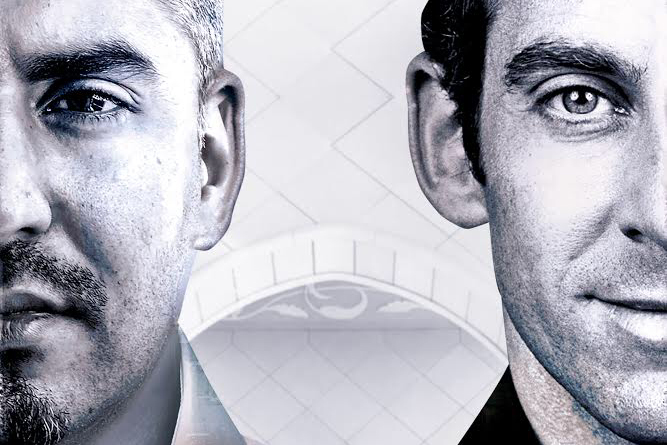Long Read
A Life of Pretending: Being Egyptian and Atheist
A host of experiences answering the same question across Egypt had me braced for a look of pained disappointment.

Note: All the names in this story have been changed, aside from those of public personalities.
The sun was almost directly overhead as I slipped out from the rambling alleys of the Khan al- Khalili into the open square. Al-Hussein Mosque towered ahead to the north. The call to prayer blasted from its pencil minaret, its solemn strains echoed by a cacophony of loudspeakers across the city. Exhausted and craving coffee, I headed for the strip of tourist-trap cafés lining the square’s western edge, and was barely seated when a young Egyptian couple motioned for me to join them for a game of backgammon.
As I’d come to expect after nearly a dozen visits to Egypt over the years, the question of religious identity came up within a minute, and I answered honestly. Just as often I’d opted to lie, claiming to be Christian for civility’s sake, but I told this stylish young couple the truth: I’m not religious. A host of experiences answering the same question across Egypt had me braced for a look of pained disappointment. But ‘Amr’s eyes lit up with a smile as he leaned into the table: “I’m an atheist too.”
Rather than going our separate ways, ‘Amr, Sara, and I walked together towards Bab Zuweila, climbing to the spacious roof of the Mosque of Sultan al-Mu‘ayyad for panoramic views of Old Cairo and, even more precious for ‘Amr, for solitude. With no one around, he unloaded his journey towards nonbelief, from teenage skepticism to angry backlashes from friends in whom he had dared confide. Among the latter group he couldn’t recall a single non-hostile reaction.
At the age of 10, ‘Amr’s failure to memorize the Qur’an brought him beatings, the force of which he resented even then. Voiced skepticism throughout his youth earned him further harsh treatment from family members, whose religious discipline he recalled growing progressively more strict along with gradually closer subscription to the channels of Gulf-based imams. Upon coming to terms with his own atheism, ‘Amr – like the vast majority of nonbelivers in Egypt – took pains to keep it to himself.
His girlfriend barely spoke a word, but ‘Amr wasn’t nearly finished. With much more to say than the time in which to say it, he suggested we carry on talking in a downtown café. Here, he said, he’d recently spent a good amount of time with a growing group of Egyptian atheists, all of whom he’d met online, sharing similar experiences and venting frustrations with life as a nonbeliever in one of the world’s most religiously restrictive countries. These gatherings were like manna for ’Amr. He heard dozens of accounts comparable to his own – stories of being evicted, forcibly medicated, losing jobs, being blacklisted from entire industries, losing friends, families – wives, husbands, children – and, for an unlucky few, jail.
‘Amr was on the phone with one of these new friends when a bit of eavesdropping on his mother’s part pulled the curtain on his outright nonbelief. He wishes he’d been more careful. Her discovery poisoned family relations, and ‘Amr’s parents still persist in their efforts to get him psychiatric treatment to ‘cure’ the supposed mental illness of nonbelief.
Still, the downtown group brought ‘Amr hope. At the last meeting, more than thirty nonbelievers had gathered, and he assumed their numbers would only continue to swell. Indeed, the ‘phenomenon’ of atheism has been noted over the past few years across the Middle East. In ‘Amr’s view, Egypt was poised to bound into a future that was inevitably secular. That was in the spring of 2014.
* * *

Barbershop in downtown Cairo.
The next time I met ‘Amr was in March of 2017. He asked me to join him at a café in the more upscale, cosmopolitan neighborhood of Zamalek, one of Cairo’s precious few spaces in which he deemed it ‘safe to talk.’ Much had changed.
As in the early stages of his journey from faith, ‘Amr once again felt isolated and alone. I guessed he’d lost about 10 kilos. His eyes occasionally darted towards the door, and his outlook had become as bleak as any I’d yet heard. “Egypt,” he said, “will never change.” He informed me that just a few days after my previous visit, he and his friends were forcibly evicted from their downtown venue with physical intimidation and taunts from both customers and staff who were appalled to discover that ‘Satan worshippers’ were expressing their ideas in such a public setting.
Egyptian media has reflected this deep-seated outrage, addressing atheism as an affliction brought on by a blend of corrupting Western influences and religious ignorance. The two extremes of the latter, according to state media and its cheerleaders, are personified by the militant Islamists of the Islamic State and the Muslim Brotherhood on one hand, and atheists on the other. To fight it, the state has launched a ‘war on atheism’ – an ambitious five-year plan that included the publicizing of nonreligion’s rapacious effects on society, the training of imams to ‘cure’ it, and even a special task force to arrest atheists who are active online.
Five years on, it’s clear that the plan hasn’t quite eradicated atheism. It has succeeded, however, in making Egyptian atheists afraid. Following the café incident, ‘Amr’s entire group fled Cairo. Some managed to escape the country, though the Egyptian coast was as far as most were able to get from the social strictures and listening ears of the capital.
Among the latter group of ‘Amr’s friends was Ahmed Harqan, who had become one of Egypt’s better known atheists online, appearing in a series of unprecedented televised debates. In one such appearance, Harqan recalled his Salafi past, explained the intellectual roots of his own doubts, and claimed that Egyptians aren’t given the space to think critically about religion. Still more insultingly, he argued that the acts of ISIS and Boko Haram aren’t all that different to those of the Prophet and his companions.
Not long after one of these shows, an angry mob attacked Harqan, not sparing his pregnant wife. Both escaped with minor injuries, but the unborn child was lost. Upon reporting the incident at the police station, the officers found them worthy of further harassment, after which they were briefly imprisoned. That was their cue to go into hiding, where they remain today.
I asked ‘Amr about Sara. His non-religious views, he said, had now lost him quite a few friends and girlfriends since my last visit. Just recently, another girl had chided him with a verse from the Qur’an. In response, he pointed out that they’d already slept together. “Did she really think I was a Muslim?” As for Sara, she’d left him within hours of our time together. He’d never revealed his atheism to her until our day of wandering. ‘Amr laugh off the memory, again pointing out the hypocrisy: “And we were fucking too!”
The Revolution Goes Online
During the brief opening that followed the 25 January Revolution, an unprecedented host of voices hurled themselves into Egypt’s public square. Among them were atheists like Ahmed Harqan. Seven years later, public debate had been effectively quashed. In a country admired for its legendary humor and sarcastic wit, few, for instance, would dare openly mock the elections between Sisi and himself.

Cairo
The internet, however, remains an outlet. Indeed, it’s the only one in which some atheists can air their views and share their personal experiences with religion. In response, pages dedicated to taking down ‘anti-Muslim’ and ‘anti-Christian’ pages have proliferated. And thanks to these vigilant reporters of anti-religious hatred, many posters have wound up in jail.
Despite being branded as incubators of bigotry, online forums for the nonreligious have grown steadily since 2011. For apostates like ‘Amr, ‘Ali, and Haider, these have proved vital, especially at times when meeting another atheist in person was just about inconceivable. Such pages offer much-needed support, buffering newfound identities against a hostile environment.
In early 2015, Haider ‘found atheism’ through the Facebook page of Sherif Gaber, an activist currently in hiding. “He has half a million views on Youtube,” he said excitedly. As of 2018, Gaber’s videos have topped nine million views. Though Haider found them deeply unsettling at first, in time he found reason and humor in them, and he now hopes and believes that the internet will allow his generation to become more vocal and expressive. “We are more brave than before,” he said.
Typical posts share news stories of sectarian violence, videos clips from Christopher Hitchens, Sherif Gaber, or MEMRI. Some are simply quotes. The latter come from speakers as diverse as Iraqi social critic ‘Ali al-Wardi, Egyptian-German atheist Hamed ‘Abd al-Samad, Thomas Jefferson, and Ricky Gervais. Raif, who left religion several years before 2011, laments that it was only after the Revolution that he was introduced to the brilliance of George Carlin.
One popular, satirical account poses as “a member of the Commission for the Promotion of Virtue, a sword on the necks of heretics, secularists, liberals, magicians and Shiites.” As with many such pages, its aim is use humor to undermine religious and social distinctions. As opposed to castigating the religious themselves, there’s more often some effort to separate the ideas, books, and beliefs from the people that subscribe to them. Private groups often follow similar guidelines. One cites a commitment to intellectual freedom and pluralism, respect for people of all backgrounds, and rejection of “intolerance in all its forms, whether religious, sectarian, racial or class-based.” Theists are allowed to join the discussion so long as they follow the rule of “mutual respect.”
Of course, there is plenty of in-group/out-group thinking on Egyptian atheist forums, including outright mockery of what many members see as pure religious lunacy. But on closer inspection, nuance isn’t always lost. Many Egyptian atheists take pains to emphasize that the ‘otherized’ entity at the stake in such forums is religion, not the religious. In their sights are doctrines, dogmas, and ideologies rather than the people – who often include atheists’ entire families.
Profiles of Egyptian Atheists
Like anywhere else, the nonreligious of Egypt are a diverse crowd – secularists by default, committed atheists, ardent critics of religion, and everything in between. As in the West, most Egyptian atheists depart from religion while young. They’re more often male, middle- or upper-class, intelligent, and well-educated.
In a book he co-authored entitled The Nonreligious: Understanding Secular People and Societies, Phil Zuckerman – a sociologist who has extensively analysed data on the nonreligious in the West – has written that there are, broadly speaking, “shallow” and “deep” forms of apostasy. Apostates towards the latter end of this spectrum have severed ties with religion completely. There are also “mild” and “transformative” forms of apostasy. While apostates towards the mild end are more or less indifferent towards the topic, most having never been particularly religious to begin with, those towards the transformative end have most often been raised to be religious. For them, the process of apostasy has often involved “massive psychological reorientation from a religious worldview to a secular worldview,” resulting in alienation or even rejection from former religious communities, friends, and family.
Here, Zuckerman emphasizes the importance of social context: the more ubiquitous the religiosity, the more likely apostates are to experience transformative rather than mild apostasy, and to be deep rather than shallow apostates. So, while Danes may more often casually abandon religion, Egyptians – living in one of the most religiously restrictive countries on earth – more often carry the impact of their apostasy long after they’ve left religion. Indeed, the seeming abundance of deep and transformative forms of apostasy in Egypt speaks to the power and dominance of its religious discourses.

Mausoleum of Shahin al Khalwati.
The Roots of Nonbelief
State media and Al-Azhar scholars blame ISIS, the Muslim Brotherhood, and ‘new atheists’ like Sam Harris for the rise of Egypt’s non-believers. Of course, the roots are a bit more complex than that. As the substantial body of scholarship on nonreligion has shown, the causes are many and various. Still, some currents appear to be of particular importance to Egyptian atheists.
It’s certainly true that Islamism’s rise has been a boon for doubt and disbelief. Here, it seems, Al-Azhar has it partly right. For Eslam, 9/11 amplified the discord between its perpetrators’ ideology and his own liberal, individualized interpretation of Islam, one that also jarred with the mainstream of Islamic discourse in Egypt. Morsi’s brief rule – arguably the peak of Egypt’s Islamist fervor – pushed many young doubters towards critical accounts of religion. For Haider and ‘Ali, more recent apostates, the rise of ISIS – closely followed online – prompted despair and doubt.
It is also true that Western voices have made some impact. Many Egyptian atheists are aware of at least one of the so-called “Four Horsemen of the Counter-Apocalypse.” Raif, Eslam, and Hazem have all read The God Delusion, the Arabic translation of which has been downloaded well over 10 million times. Haider and ‘Ali laughed as they recalled a televised debate in which Ahmed Harqan had tried to clarify which figure his clerical opponent hoped to castigate when referring to “Charles Dawkins.”

Still, the direct influence of so-called ‘new atheists’ has its limits. To overstate such foreign channels is to overlook the legacy of Egyptian freethinkers and atheists, a memory the Egyptian state has long tried to wipe from the national record. Ahmed Lutfi al-Sayyid, pioneer of the modern translation movement; Salama Moussa, pioneer of Egyptian socialism; ‘Abd al Rahman Badawi, pioneer of existentialism – all were avowed Egyptian atheists. Though officially banned, a host of Egyptian critiques and commentaries on religion have made waves, including the early twentieth-century work of ‘Abd al-Rahman Badawi, From the History of Atheism in Islam (available in Arabic here), and, almost a century later, ‘Abbas ‘Abd al-Nur’s My Ordeal with the Qur’an and with God in the Qur’an. ‘Abd al Nur had spent the bulk of his life a pious Sufi sheikh in the Nile Delta before abandoning religion in his early eighties. Written in classical Arabic style, the book’s fiery tone reflects the extreme depth its author’s apostasy, laying out a brutally critical genealogy of Islam.
Through a Lebanese girlfriend, Raif considered himself lucky to obtain a copy of the latter. He called it the lynchpin of his apostasy, the ‘most perfect critique of Islam.’ Similarly impressed were ‘Ali and Haider, apostatizing almost a decade later, though they simply downloaded the free PDF online. Such works’ assaults on religion are certainly no less harsh than those of Harris, Dawkins, or Hitchens.
Certain Western scholars of the Arab and Islamic worlds – when not completely ignoring apostates in the region – prefer political explanations for nonbelief. Their valiant and overriding quest has long been to affirm the humanity of Muslims and challenge notions of Western superiority. Certainly, Egyptian atheists present a challenge to the dominant master narrative that regards secularism and liberalism as a Western-imposed structure of power, perennially at odds with its ‘Other,’ Islamic piety. In light of such a narrative, it’s easy to see why the existence of Egyptian atheists sits almost as uncomfortably with these scholars as with the Egyptian state.
For much of her prominent career, the late scholar of Islam Saba Mahmood dismissed ex-Muslims and imputed treacherous, political motives and outright dishonesty to their concerns with Islam. Charles Hirschkind – an assistant professor of anthropology at the University of California, Berkeley – sought to invalidate Abu Zayd’s critique of the Qur’an for its “modernist reworkings” of Islamic modes of interpretive reasoning, while Mahmood described Zayd’s work as “disenfranchising traditional modes of interpretation,” thereby implicitly accusing the reformist Muslim scholar of a lack of authenticity for speaking in secular terms. At the same time, she defended the singular legitimacy of Muslim outrage over the Danish cartoons against critics’ incapacity or unwillingness to understand. For someone who made calls to conceptualize “freedom as a contextual, rather than universal, practice,” and to ‘problematize’ such ‘secular’ notions as human rights and tolerance, it’s perhaps unsurprising that Mahmood showed an unwillingness to understand the growing population of ex-Muslims within her region of expertise.
Individuals such as ‘Amr and Raif are merely inconvenient obstacles to such sweeping theorizations, complicating a grand narrative that strives to pit East against West. More accurately, this narrative pits secularism against Muslim ethics, and frets about the former’s subtle aims of dominating, subjugating, and marginalizing the latter.
Like the scholars of Al-Azhar, these scholars are partly right: in Egypt at least, political concerns do motivate nonbelievers. However, they do not seem to motivate nonbelief. As a group, Egyptian atheists are scattered widely across the political spectrum. In politics, the only real consensus – even among the otherwise politically apathetic – lies in their view of religion’s role, a view upon which they converge in the wake of apostasy. All share the desire for secularism, defined as the separation of mosque or church and state.
A much more unifying factor cited by Egyptian apostates is what Hume called “the problem of the many” – the brush with alternative religious discourses. As has been noted among Western apostates, religious diversity helps to impair the plausibility of all religious discourses, rendering nonreligion a conceivable worldview.
For Sherin, it was bewilderment over the mechanics of the Christian Godhead, exacerbated by Islamic proselytization within her own family. A philosophy of religion class she took while studying abroad exposed her to critical accounts of a range of world religions. Yasmin was led to question her faith while studying ancient Egyptian religion, while Tarek’s curiosity was piqued perusing his father’s collection of books on Buddhism. Raif read much of the Bible and attended church from time to time with friends, prompting a closer look at the Qur’an. As ‘Ali studied Russian culture and consumed Bollywood films, he noticed marked similarities and contradictions among religious traditions, his incredulity gradually expanding to take in elements of his own. Religious multiplicity gave an intellectual push to many, but overall this concern appears to be peripheral to apostasy. More substantial were the concerns of believers arising from within the faiths.
Rational and Moral Concerns
Omar was among the oldest Egyptian atheists I’d met. Before his apostasy about six years prior, he was hailed as a sheikh within a tight-knit community, and had dished out more than a decade’s worth of religious counsel, ever defending the faith. Doubts arose during his pursuit of a higher education in Islamic Studies. Research sparked further research into matters he found historically problematic for the narrative he’d so long upheld. By his mid-forties he’d renounced Islam. Former friends and colleagues ostracized him, and his wife divorced him and took away his child. When I visited, the walls of Omar’s otherwise spartan apartment was covered with photos of the boy.
His transformative apostasy lent the ex-sheikh deep sympathy for the likes of Ahmed Harqan – vocal atheists widely considered by the Egyptian state and much of its society to occupy ‘the other extreme,’ the supposedly mirror image of militant Islamism. Omar too had dabbled in public endeavors, landing television spots for his expertise on Islam. For safety’s sake, he presented himself as a ‘reformer’ rather than an outright atheist.

Ramadan crowds, Cairo.
As we scanned the religious channels on his satellite TV, Omar offered a paragraph of commentary for each sentence from the hosts, criticizing the extreme views of certain imams as well as what he deemed to be the acrobatic apologetics of more moderate voices. His more vehement criticisms were reserved for the latter’s doctrinal oversights and selective interpretations. On a Christian channel, two Catholics discussed the controversy surrounding Aisha’s four witnesses, and Omar cut them off almost at once, naming and addressing the circumstances of all four and indicating that this particular revelation was about accommodating the Prophet’s marriage to the wife of his adopted son. That, Omar explained, is why adoption was invalidated in Islam. He shook his head. “Religion is always fueled by politics.”
A combination of rational and moral concerns with religion are almost unanimous features of Egyptian apostates’ pathways from faith, and these both lead towards, and are amplified by, critical accounts of religion. For Omar, collision with a host of rational and logical inconsistencies, such as supposed grammatical errors and historical anachronisms in the Qur’an, brought about his tumultuous departure from the faith. Like many ex-Muslims, having once believed the Qur’an to be not merely infallible but eternal and uncreated, he found historical discrepancies difficult to absorb. They were severe blows to religious credulity.
For ‘Ali, the notion of wealth as a reward for faith among Muslims – but not among non-Muslims – was undermined by the contrast between much of the Muslim-majority world and ‘godless’ nations like Denmark. The latter, he noticed, enjoyed enviable levels of stability, equality, and economic prosperity. Eslam, in his efforts to defend his faith in online forums, described as a ‘landslide’ the accumulation of cracks in what he’d once considered to be a comprehensive system. With such high standards for religious consistency, the crumbling of parts did not spare the whole, despite their best efforts to remain faithful.
Indeed, in a majority of documented cases worldwide, the turn from religion is not the initial intent, but rather something that simply happens to the apostate – a cognitive landslide. Zuckerman has dubbed such an inability to believe the “acquired incredulity syndrome.”
A century ago, Egyptian atheist ‘Abd al Rahman Badawi described the same feeling: ‘‘[Atheism] is, actually, the natural result of the life of those who did their best to be believers. There remained nothing further to be done.”
What drove English freethinkers from religion in the nineteenth and early twentieth centuries, wrote Susan Budd, was “the realization that the Bible, minister, etc., was wrong – that is, morally wrong.” Likewise, in undertaking breakthrough research on nonbelievers in pre-revolutionary Egypt, anthropologist Samuli Schielke noted that, among nonbelievers there is “an unusually strong trust in one’s own moral judgment.” Concepts of justice, honesty, gender equality, human rights, and broad-based tolerance were woven into their dispositions.
While all of these notions can and do often co-exist with faith in the unassailable morality of God, for my interlocutors the latter became a casualty of independent moral judgement. While Egyptians largely see God as a necessity for motivating ethics, Egyptian atheists were willing to challenge the morality of God where it contravened their own.
A sense of injustice runs deep among nonbelievers, and is perhaps the most commonly expressed thread among them – from the geographically-based exclusivity of salvation and the unfair treatment of women to the seemingly disproportionate punishments of the hereafter. Hanan was troubled by the notion that only Muslims – including “bad Muslims who are hypocrites” – would reach paradise, and came to see the veil as a loathsome symbol of her own oppression. Haider was alarmed to find that Al-Azhar was at least theoretically in agreement with the Islamic State over many of its most abhorrent practices. Sherin’s Christian father, shortly after being left by her mother for a Muslim man, was struck with cancer. “He was a good man,” she said. She was unable to justify the pain and sorrow of her father’s final years. For her faith, this was the breaking point. “No good God could allow that.”
To Armin, a 28-year-old gay Alexandrian with relatively pious and severely disappointed parents, gay Muslims are simply “in denial.” Unlike them, he couldn’t reconcile the acceptance of his own sexual identity with the fact that all four schools of Islamic jurisprudence condone the killing of gays. For him, the former precluded a belief in divine justice. For Mona, it was over a decade of beatings at home. Raised conservatively, she donned the veil at fifteen and married soon after. As the first doubts surfaced, her family doctor prescribed antidepressants which she faithfully took for years. Eventually, it was the Qur’anic prescriptions for the disciplining of wives that she could no longer stomach.
Another theme within the moral realm common to Egyptian atheists relates to honesty and integrity, reflected by an almost Christlike contempt for lying and hypocrisy. In Egypt, where external displays of religiosity are integral to communal belonging and even national citizenship, many atheists would readily agree with Hume’s supposition that convictions are “more affected than real.” From surgically reconstructed hymens to the banning of hijabi fashion at upscale bars and nightclubs (so as not to discomfort alcohol-drinking Muslim patrons), there are plenty of instances in which religiosity appears little more than skin-deep. According to one of my interlocutors, a perfect representation comes around every Friday at prayer time, when certain cafes-cum-prositution-venues refuse to serve shisha for about an hour.
Raif reported that hypocrisy’s role in spurring apostasy shone particularly bright during Morsi’s brief rule, accentuating the gaps between religious appearances and realities. Meanwhile, other atheists defended the fundamentalists as the least guilty of dishonesty. For example, both Khaled and Eslam held the Western scholar Reza Aslan in particular contempt, charging him with deliberate dishonesty and obscurantism on the topic of religion. Salafis, they argued, weren’t nearly as selective in their religious observance.
Nor were the widely-mocked, ‘fad-following’ young atheists spared scathing criticism for insincerity. Such a group of self-identified ‘atheists’ is said to have cropped up in recent years in secondary schools across the country. According to Raif, ‘Amr, and others, though, they are wholly incoherent, all style rather than conviction – atheists “without knowing why.” My own encounters with Egyptian atheists made it clear to me that they all knew why. Among these men and women, deep and transformative apostasy was very nearly unanimous. And they each had plenty to say about their rocky journeys from faith.
Just as numerous studies from Western contexts have found, doubts first arise within the moral and rational realms. Indeed, they appear to be very much the same as those voiced by apostates elsewhere in the world – the problem of the many, the problem of evil, scriptural clashes with science and history, religious hypocrisy. But simply becoming an Egyptian atheist is one thing; being one quite another. Most have still more to say about the struggles they have faced since leaving religion behind. Under a variety of circumstances, Egyptian atheists face an often daily ordeal of passing and pretending to some measure of religious belief. Their strong aversion to moral hypocrisy makes this especially challenging when they are obliged to falsely convey the affects of faith.

Downtown Cairo
The Double Life: Being an Egyptian Atheist
Haider, one of the more vocal atheists (online) that I’ve met, wouldn’t dream of wrecking his family relations by betraying his nonbelief at home. Visits to the mosque with his family, pretending to pray, feigning belief at mealtimes – it’s all quite tiring for him, but absolutely necessary. “I’m forced. I don’t want to but I must.”
The potential for destroyed relationships dissuades most from affirming their nonbelief in the home. The fear of similarly devastating reprisals often has the same effect among friends and colleagues. Atheists must be vigilant lest they slip up – the wrong facial expression or comment could do the trick. When Haider’s little brother worries about jinn (mythical beings made of fire), Haider would much prefer to offer what he now considers the truth. But instead of saying, “the jinn aren’t real,” all he dares is, “don’t be afraid of the jinn.” For ‘Amr, a careless phone conversation broke his cover and ruined his family relations. For Khaled it was a more minor misstep. He took issue with his boss’s statement that “there have never been any great atheist artists,” and subsequently lost his job for breaching the company’s ethical code.
Though it’s hardly the truth, many Egyptian atheists simply resign themselves to being seen as indolent or careless Muslims. “God will decide whether I pray,” Raif says to his mother during Ramadan. To mitigate the sense of hypocrisy, Haider opts to pass as Christian. He invoked this defense when he was scolded for wearing headphones in a microbus as the Qur’an was recited over the speakers. Sherin, questioned about her vegetarianism on the grounds that God made the killing of animals halal, replies that she simply doesn’t feel like eating meat. Rather than articulate her personal concern for animal well-being, she does what atheists are forced to do daily – she self-censors.

“Don’t tell anyone,” Raif’s communist grandfather had said, “they won’t understand.” He wonders about about the more vocal variety of atheists active in Egypt since the Revolution. For him, passing and occasionally pretending has become an art form to perfect, a time-honored tradition of secrecy. Raif’s grandfather kept his silence for half a century. How could they be so bold as to go public now?
Nevertheless, some do choose not to pass or pretend. Perhaps, especially for those having endured deep and transformative apostasy, the pain of silence may be too much to bear. For ‘Amr, Armin, Mona, and others, family relations have likely forever changed for the worse. Omar and Hanan appear to have lost their families completely.
* * *
Sometimes Raif, well-known among the hip, urban crowd of downtown Cairo, gets mail from younger atheists, announcing their nonbelief. His mental response, he tells me, is, “So what?” Khaled described his atheism as just one aspect of his identity among many. Eslam explained, “I’m not an atheist, I’m just Eslam.” Raif had spent a “whole fucking summer” memorizing the Qur’an at the age of 12, but his scriptural knowledge has faded over the years. He’s no longer interested in scanning online atheist forums. Religion’s priority has long since been eclipsed by other, more earthly concerns – politics, music, dance, finding a girlfriend…
Just as Zuckerman has observed of the nonreligious in the West, “deliberately secular identities” do not replace religious ones in the long term:
Rather, the acceptance, importance, or relevance of religion in their lives simply fades and they get on with the business of building lives and families and communities without it. … [I]f one imagines an endpoint to secularization, this would not be active irreligion or militant secularity but indifference or neglect. This seems to apply equally well to individuals as well as to societies.
For many atheists in Egypt, however, complete indifference to religion is a luxury still well over the horizon. Although religion’s relevance has certainly faded in the personal lives of Raif and Khaled, among each of the most longtime non-believers I encountered, religion’s near omnipresence in the Egyptian context – permeating both state and society – means that concerns about the topic are never too far from the surface.
* * *
However, some atheists have returned to religion after the first backlash. Famously, this was the pathway of Mustafa Mahmoud, brought to trial by Nasser in 1957 for publishing a book critical of faith. Embodying the public mood in which Islam came to occupy center stage, Mahmoud re-embraced Islam soon after 1967, becoming a long-running media sensation with his series ‘Science and Faith’ (al-‘ilm wa-l-’iman).
Between visits to Egypt, I noticed a similarly dramatic change in the tone in Omar’s online posts. It appeared the ex-sheikh, like Mahmoud, had returned to religion. He didn’t respond to my messages, and his Facebook wall now featured quotes from the Qur’an, minus his typically cynical commentary. I noticed there had been a sudden switch from historical and doctrinal discussions – regarding, for example, the killings of early Islamic dissidents or the pre-Islamic origins of Ramadan – to pious posts about the oneness of Allah. The older posts were now deleted. Had he reverted? Was this a desperate attempt to gain access to his estranged son?
A year had passed in the lives of my Egyptian friends when I returned last month to catch up. Eslam is elated at having received a visa to study in Australia. Khaled, Raif, and ‘Amr have earned promotions at work, allowing the latter to finally escape the toxic environment of his family home. ‘Amr showed me Sara’s recent engagement photos. He said he missed her but had no regrets. Even with all the latest dating apps, finding a likeminded partner is far from straightforward. He now suspects a couple of other atheists at his workplace, but he doesn’t dare to broach the subject.
Yasmin is beginning to mend her relationship with her religious father, although her sister still refuses to speak to her. Mona is carefully working on her Salafi son, who called on friends to have her killed at the time of her apostasy. Hanan, now two years on from taking off the hijab and leaving home, has come to terms with the loss of her family. She’s healthier and happier today, though no less frustrated with the daily struggle of being both an atheist and a girl in Egypt.
Even more intensely than than a year ago, all hope to escape the country sooner or later. Khaled wasn’t being purely facetious when he weighed some form of public blasphemy as a fast track to asylum in Europe. Haider and ‘Amr were still the most optimistic, the latter despite the dreaded years of military service that loomed ahead. Time is on our side, they said. It may get worse before it gets better, but it will get better.
And they may be right. According to studies by Will Gervais, an increased presence for atheists – which the Egyptian state campaign is unwittingly publicizing in Egypt – spells a reduction in anti-atheist prejudice in the long run. But how much worse will it get? The state assault on atheism has reached fever pitch in recent months. A new bill currently under discussion threatens to ban not simply atheistic expression – but atheism itself. The bill’s sponsor, ‘Amr Hamroush, rightly points out that since freedom of belief is written into the Egyptian constitution, atheism is – technically – allowed. He and his supporters claim the new law will fix this oversight, thus preventing Egyptian youth from falling victim to the ‘phenomenon’ of non-belief.
Of course, atheism is far from the only threat to ‘authentic’ Egyptianness. Religious minorities such as the Shi’a and Baha’i have zero official recognition, and members are occasionally singled out by authorities. In response to a few rainbow flags raised during an September 2017 Mashrou’ Leila concert in Cairo, some sixty people were arrested. Bizarrely, singer Sherine Abdel Wahab was sentenced in February to serve six months in prison for denigrating not the sanctity of religion but of the Nile. You’ll get bilharzia, she said. “Drink Evian instead.”
Over beers towards the end of my visit, I was at last able to ask a mutual friend what had happened to Omar. One of his brave posts, all of which seemed to test the limits of his religious audience’s patience, had finally gotten him arrested. Fortunately, he only served the minimum sentence of six months. His ex-wife, who had divorced him for his turn to atheism and refused to let him see their child, took control of his Facebook page. Released a few months ago, I noticed that he’d learned nothing in prison: his most recent posts were as bold as ever.
As Simon Cottee demonstrates in The Apostates: When Muslims Leave Islam, a book that draws on interviews with ex-Muslims living in the West, the topic remains widely misunderstood. The struggles of apostates are abstracted and politicized in the service of narratives – whether of religious barbarism or secular hegemony. But these struggles are also deeply personal. These are neither ‘native informants’ nor rabidly anti-Muslim bigots, and their experiences of apostasy are in many ways no different from those of ex-religionists elsewhere in the world.
However, unlike those living in the West, where freedom of belief, conscience, and expression are still enshrined in law, Egyptian atheists – on pains of disownment, imprisonment, or even death – don’t have the luxury of opening their mouths. Perhaps we in the West should open ours.
All Photographs are copyright of the author.
Anthon Jackson is a writer and photographer with an MA in Arab & Islamic Studies. You can follow him on Twitter @janthonjackson






